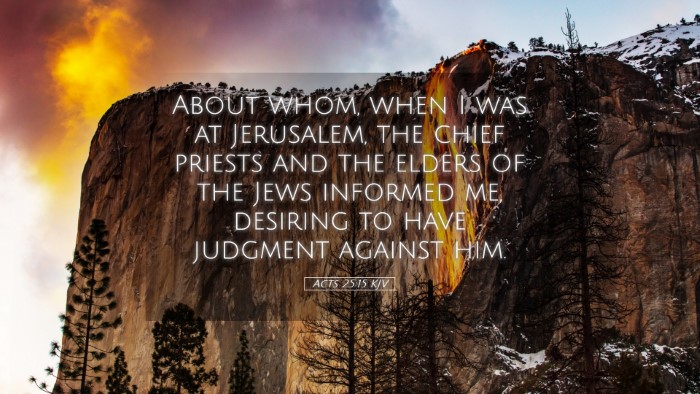Old Testament
Genesis Exodus Leviticus Numbers Deuteronomy Joshua Judges Ruth 1 Samuel 2 Samuel 1 Kings 2 Kings 1 Chronicles 2 Chronicles Ezra Nehemiah Esther Job Psalms Proverbs Ecclesiastes Song of Solomon Isaiah Jeremiah Lamentations Ezekiel Daniel Hosea Joel Amos Obadiah Jonah Micah Nahum Habakkuk Zephaniah Haggai Zechariah MalachiActs 25:15
Acts 25:15 KJV
About whom, when I was at Jerusalem, the chief priests and the elders of the Jews informed me, desiring to have judgment against him.
Acts 25:15 Bible Commentary
Commentary on Acts 25:15
Verse: "About whom, when I was at Jerusalem, the chief priests and the elders of the Jews informed me, desiring to have judgment against him."
Introduction
This verse is situated within the narrative of Paul's trial and the political maneuverings surrounding his imprisonment. The account highlights the tension between Roman authority and Jewish leadership. A careful examination of Acts 25:15 provides insight into the broader implications of justice, the interplay of religious and civil authorities, and the role of the early church in responding to opposition.
Contextual Insights
The events leading to Acts 25:15 involve Paul's arrest in Jerusalem and subsequent transfer to Caesarea. This verse explicitly reveals the intentions of the Jewish religious leaders who sought to manipulate the judicial system to achieve their objectives. Paul, as a Roman citizen, invokes his rights, which adds layers to the political and spiritual dynamics at play.
Matthew Henry's Commentary
Matthew Henry emphasizes the contrast between the integrity of Roman law and the malice of the Jewish leaders. He notes that their desire for judgment is rooted in envy and a determination to eliminate a prominent Christian leader.
Henry also points out that these leaders did not come forth with reasonable accusations but rather with a malicious intent to destroy Paul’s ministry and influence. Such actions reflect a broader pattern of spiritual conflict where the gospel faces opposition from established religious structures.
Albert Barnes' Notes
Albert Barnes elaborates on the significance of the words "desiring to have judgment against him." He suggests that the term 'judgment' here indicates a formal legal process, highlighting the procedural aspects of Roman law. This context serves to underscore that Paul stands on the firm foundation of justice rather than the whims of his accusers.
Barnes further indicates that the Jewish leaders’ desire for Paul’s condemnation was not merely about legal justice but also stemmed from deep-seated animosity towards the burgeoning Christian faith. The interplay of their envy, religious zeal, and political aspirations raises critical questions about the nature of authority and the legitimacy of spiritual envy.
Adam Clarke's Commentary
Adam Clarke offers a more historical perspective, discussing the ramifications of the Jewish leaders' request for judgment. He points out that such plots were not uncommon in Jerusalem, as the religious leaders often resorted to manipulation to achieve their ends, undermining the integrity of the judicial process.
Clarke also notes that this incident reveals the importance of governance—stressing that Roman officials were often wary of inciting Jewish unrest. Paul's situation exemplifies the tension that existed during this period, where the early Christians navigated a world filled with opposition from both religious and secular authorities.
Theological Applications
- The Nature of Opposition: Acts 25:15 highlights the reality of opposition faced by those living out their faith. It invites reflection on how Christians today may encounter similar challenges and what this means for their perseverance.
- Justice and Authority: The interplay between Paul and the Jewish leaders serves as a reminder of the complexities involved in matters of justice. Christians are called to advocate for justice, even when faced with challenges in systems that may not always support righteousness.
- Response to Accusations: Paul’s example illustrates how one can maintain composure and integrity in the face of false accusations. This invites believers to rely on their identity in Christ when navigating conflicts.
Conclusion
Acts 25:15 serves as a rich text for reflection upon the trials faced by early Christians, the manipulation of power, and the unwavering commitment to righteousness exemplified in Paul. The insights gleaned from the commentaries of Matthew Henry, Albert Barnes, and Adam Clarke collectively deepen our understanding of this pivotal moment in the Book of Acts. It encourages pastors, students, theologians, and Bible scholars to consider the enduring implications of this narrative on contemporary faith practice and moral integrity.


